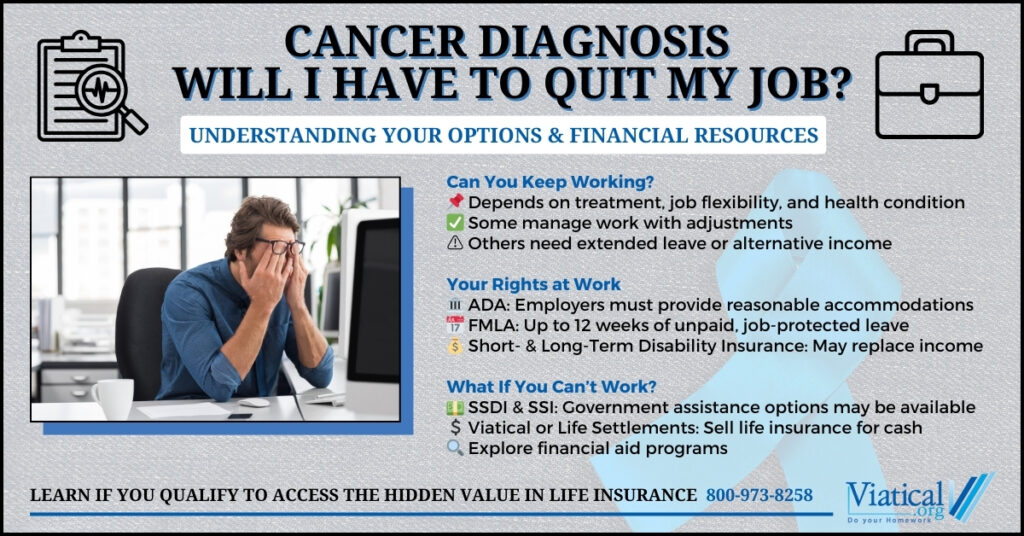Cancer Diagnosis Will I Have to Quit My Job? This question weighs heavily on many individuals after receiving life-changing news. The decision to continue working depends on factors such as your treatment plan, job flexibility, and financial situation. While some people manage to balance work with treatment, others may need extended leave or alternative income sources. In this article, we’ll explore your rights as an employee, workplace accommodations, and financial options—such as a viatical settlement or life settlements—if you can no longer work.

Can You Keep Working After a Cancer Diagnosis?
Many people with cancer continue working during treatment, while others need to take time off. Your ability to work will depend on:
- Your treatment plan – Some treatments, like chemotherapy and radiation, can cause fatigue, nausea, or cognitive difficulties, making it challenging to maintain a full work schedule.
- Job flexibility – Remote work, flexible hours, and modified duties may help you keep working while managing treatment side effects.
- Employer support – Some workplaces offer accommodations, such as extended leave or a reduced workload, to support employees with serious illnesses.
If you want to continue working, discuss your situation with your doctor and employer to determine what’s feasible.
Your Rights as an Employee
If you’re employed in the U.S., several laws protect your job and benefits:
- The Americans with Disabilities Act (ADA) – If your employer has 15 or more employees, they must provide reasonable accommodations, such as flexible hours or work-from-home options, as long as you can still perform your job.
- The Family and Medical Leave Act (FMLA) – If you work for a company with 50 or more employees, you may be eligible for up to 12 weeks of unpaid, job-protected leave.
- Short-term and long-term disability insurance – If your employer offers disability insurance, it may replace part of your income if you’re unable to work.
It’s important to understand your rights and speak with your HR department about available options.
What If You Can’t Work?
If working becomes too difficult, you may need to explore financial alternatives, such as:
- Social Security Disability Insurance (SSDI) – If cancer prevents you from working, you may qualify for SSDI benefits. Certain cancers qualify for expedited approval through the Compassionate Allowances program.
- Supplemental Security Income (SSI) – If you have limited income and assets, you may be eligible for SSI benefits.
- Life Settlements and Viatical Settlements – If you have a life insurance policy, you may be able to sell it for a lump sum cash payment to help cover medical bills and living expenses. Viatical settlements are available for those with a terminal illness, while life settlements may be an option for others. One thing to consider is that Group life insurance policies are generally only eligible for life settlements if you are no longer employed with the company.
Making the Best Decision for Your Health and Finances
Deciding whether to continue working after a cancer diagnosis is personal. Some people find that maintaining a job provides a sense of normalcy and financial security, while others need to step away to focus on treatment and recovery. Understanding your rights, available resources, and financial options—such as a viatical settlement—can help you make the best decision for your situation.
If you’re considering selling your life insurance policy to ease financial stress, call us at 800-973-8258 to learn if you may qualify and for a no obligation policy appraisal.
